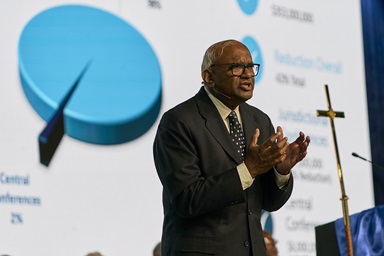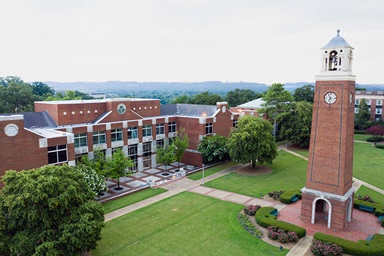Grace United Methodist Church was already planning for a tight budget this year before COVID-19 forced the Dallas congregation to meet solely online.
“Our collection plates were not exactly overflowing before, but now there aren’t any to pass around,” said Paul Ott, chair of the church’s administrative council. “You can give online, but not everybody can or will.”
That’s why Grace United Methodist Church is applying for a small-business loan under the U.S. Coronavirus Aid, Relief and Economic Security or CARES Act.
Grace is not alone. The U.S. CARES Act — signed into law March 27 — has the potential to offer struggling churches a boost at a time when giving is down and ministry needs are on the rise. After all, it’s hard to focus on the good news of the empty tomb when you’re worried about an empty bank account.
So how can this new law help churches?
Among other relief efforts, the U.S. CARES Act creates the Paycheck Protection Program with the goal of helping small businesses keep workers on the payroll during coronavirus-related closures.
Under the program, the U.S. Small Business Administration and its partner banks offer about $349 billion in federally guaranteed loans to businesses with fewer than 500 employees. The Small Business Administration will forgive loans if all employees are kept on the payroll for eight weeks and the money is used for payroll, rent, mortgage interest or utilities.
Usually, the federal agency works with for-profit businesses. However, the law makes clear that nonprofits — including churches — are eligible for these loans.
The window to apply for this loan is short: Applications opened Friday, April 3, and close June 30. They also will be awarded on a first-come, first-served basis, and church leaders expect the money to go fast.
Loan forgiveness sounds good. How large can a loan be?
Churches face the same limitations as all other recipients of these loans. The maximum loan under the Payment Protection Program is the lesser amount of either $10 million or 2.5 times a church’s average monthly payroll. The program is meant to cover eight weeks of payroll and operating expenses.
To qualify for loan forgiveness, at least 75% of the loaned funds must be used for payroll costs. The rest must be used for mortgage interest, rent or utilities.
What happens if a church uses the money for other needs?
If the funds are used for unauthorized purposes, the Small Business Administration will direct the borrower to repay.
The federal agency says forgiveness also will be reduced if the number of full-time employees declines, or if salaries and wages decrease. Loan recipients have until June 30 to restore full-time employment and salary levels for any changes made between Feb. 15 and April 26 this year.
If churches do need to repay the loan, they will have two years to do so and an interest rate of 1%. The program has no penalties for early repayment.
Those limitations work for the 274-member Grace United Methodist Church. Ott said that personnel is the biggest budget line item for the church, which has seven staff members. The church is applying for a loan of about $50,000.
“If you do with the money what you’re supposed to do and document that — which we will — then the loan will be forgivable,” Ott said. “I’ve told people it looks like a grant, as long as you follow the rules.”
Where can churches apply?
Organizations can apply for the program by calling their banks directly or through this application form on the Small Business Administration’s website.
The United Methodist General Council on Finance and Administration and the auditors LBMC, have put together a list of the documents that might help churches in their loan application.
But wait. United Methodist churches are part of a larger denomination. Will that affiliation count against churches?
That’s been a concern for some church leaders. The loans are limited to organizations with fewer than 500 employees. But taken together, all the United Methodist churches, conferences and agencies have far more than that.
Resources on loan program
Various groups have put together resources to help churches understand and possibly use the Payment Protection Program.
General Council on Finance and Administration and its auditing firm LBMC have put together an overview of the Paycheck Protection Program.
GCFA has answered questions about other parts of the U.S. CARES Act.
Wespath, the denomination’s pension agency, has a summary of the U.S. CARES Act.
GCFA and Wespath together have put together a primer on how churches can apply for loans under the new law that gets into specifics such as how to handle clergy housing allowances.
The Small Business Association has compiled answers to frequently asked questions from faith-based organizations.
The Small Business Administration already has agreed to make loans available to individual McDonald’s franchises. Individual United Methodist organizations might expect similar treatment.
In a compilation of frequently asked questions, the agency said a religious organization qualifies for an exemption from its usual affiliation rules. This applies if the churches are tied together by religious beliefs and an internal constitution, not for solely non-religious reasons.
In any case, the Church Alliance said it plans to work with the federal agency to help it understand the unique nature of church employers. The alliance is an interfaith coalition that includes The United Methodist Church’s Wespath Benefits and Investments.
In the U.S., people often talk about the separation of church and state. Does this compromise that principle?
Some Christians have worried that accepting such a loan will result in the federal government intruding on a church’s religious liberty, and the Small Business Administration has tried to ease those concerns.
The agency requires loan recipients to follow certain federal nondiscrimination rules. But it insists it will not apply those rules to a church’s ministry activities.
“Congress enacted the CARES Act to afford swift and sweeping stopgap relief to Americans who might otherwise lose their jobs or businesses because of the economic hardships wrought by the response to the COVID-19 public health emergency,” the agency said, “and SBA has a compelling interest in fulfilling that mandate to provide assistance broadly.”
Is there anything else to keep in mind?
Loan applicants will need patience. Keep in mind this law went on the books less than two weeks ago, and the Small Business Administration is still finalizing rules for administering the program.
The agency also will take time to get money out. It handled about $30 billion in small business loans in 2019. Now the agency has the responsibility of distributing more than 10 times that amount.
With that said, many applicants agree time is of the essence.
Mount Pisgah United Methodist Church, a nearly 7,000-member congregation in Johns Creek, Georgia, already has submitted applications for its separate nonprofit ministries.
They include the church itself, a counseling center, a home for people with special needs, two women’s centers and a school for children in preschool through 12th grade. Altogether, the ministries have about 400 employees, said the Rev. Steve Wood, the church’s lead pastor.
“This is a really good opportunity to keep our people employed and avoid a furlough or compensation reduction,” Wood said.
He also serves on the board of the General Council on Finance and Administration, which plans to meet April 8 to discuss whether general agencies also should apply for the loans.
Wood believes United Methodist ministries can tackle the challenges COVID-19 presents and “be real and relevant in sharing the gospel of Jesus Christ.”
“We need to seize this opportunity to make a meaningful difference in the way people view life, the way they view God and the way they treat one another,” he said.
Hahn is a multimedia news reporter for United Methodist News. Contact her at (615) 742-5470 or newsdesk@umcom.org. To read more United Methodist news, subscribe to the free Daily or Weekly Digests.
Like what you're reading? Support the ministry of UM News! Your support ensures the latest denominational news, dynamic stories and informative articles will continue to connect our global community. Make a tax-deductible donation at ResourceUMC.org/GiveUMCom.




